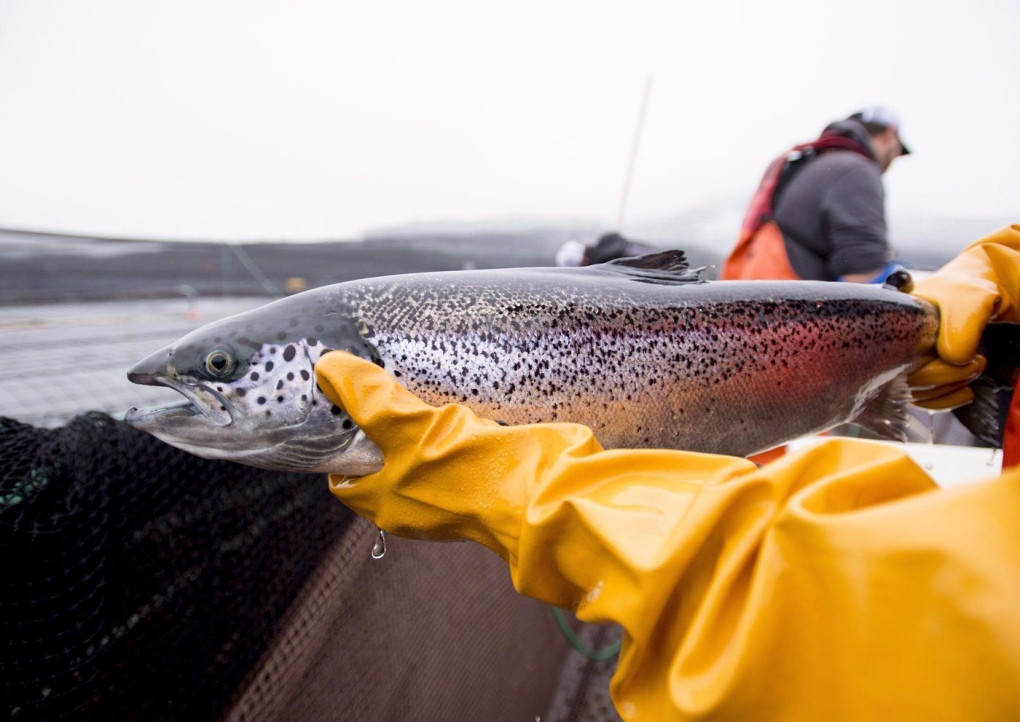Eliminating open-net fish farms in B.C. would cost taxpayers billions: report
 A farmed Atlantic salmon is seen during a Department of Fisheries and Oceans fish health audit near Campbell River, B.C., on Wednesday, Oct. 31, 2018. THE CANADIAN PRESS /Jonathan Hayward
A farmed Atlantic salmon is seen during a Department of Fisheries and Oceans fish health audit near Campbell River, B.C., on Wednesday, Oct. 31, 2018. THE CANADIAN PRESS /Jonathan Hayward
The proposed federal ban on open net-pen salmon farms in British Columbia coastal waters will cost taxpayers billions and seriously impact Canada's economy, food security and Indigenous communities, says a report commissioned by the BC Salmon Farmers Association.
The ban would result in $9 billion of "unnecessary costs" to taxpayers to close the sector and subsidize companies with "unproven closed containment technology," said the report by Ottawa-based economics consultants RIAS Inc.
It said there would be a $1.17 billion drop in annual economic activity -- including $133.6 million among First Nations -- as well as the elimination of than 4,500 jobs and the reduction of 50,000 tonnes of farm-raised salmon per year.
In June, the federal government announced it would delay the closure of open net farms until 2029 to facilitate a transition to closed containment systems.
"The proposed ban is a reckless decision by the (Justin) Trudeau government that ignores both science and economic reality,” Brian Kingzett, BC Salmon Farmers Association executive director, said in a statement Thursday.
"B.C. salmon farming companies, suppliers and First Nations within whose territories we operate have communicated to the federal government that transition cannot be a ban on marine net-pen salmon farms in less than five years and maintain a viable farmed salmon sector."
The report was released at a news conference in Ottawa Thursday by the B.C.-based Coalition of First Nations for Finfish Stewardship and salmon farming industry representative, David Kiemele, Cermaq Canada managing director.
Open-net fish farms off B.C.'s coast have been a major flashpoint connected to the debate over the decline of Pacific salmon stocks.
Environmental groups and some First Nations say the farms are linked to the transfer of disease to wild salmon, while supporters say studies indicate the farms' risks are minimal and cite economic costs if operations are phased out.
Some B.C. Indigenous leaders have called on the federal government to stand by plans to transition away from open-net salmon farms.
They include Bob Chamberlin, First Nations Wild Salmon Alliance chair, who said he was also in Ottawa this week meeting with federal government officials about the status of the salmon farm transition.
"We are working with the government to further assist it to reach its stated goals," Chamberlin said in an interview from Toronto.
He said the group represents more than 120 B.C. First Nations.
But the salmon farmers and Coalition of First Nations for Finfish Stewardship said in a statement they are now urging Trudeau to "consider a more realistic, no-cost-to-taxpayers alternative to transition that would achieve the same outcome as a ban without imposing devastating impacts on the sector, on First Nations’ rights, and on coastal communities in B.C."
B.C.'s salmon farmers have also "been committed to continuous innovation," said the statement. "Mandating the sector to transition to unproven technologies in a short time frame ignores the willingness of B.C. salmon farmers to administer alternative innovations that can achieve the same outcome."
This report by The Canadian Press was first published Nov. 28, 2024.
CTVNews.ca Top Stories

W5 Investigates A 'ticking time bomb': Inside Syria's toughest prison holding accused high-ranking ISIS members
In the last of a three-part investigation, W5's Avery Haines was given rare access to a Syrian prison, where thousands of accused high-ranking ISIS members are being held.
'Mayday!': New details emerge after Boeing plane makes emergency landing at Mirabel airport
New details suggest that there were communication issues between the pilots of a charter flight and the control tower at Montreal's Mirabel airport when a Boeing 737 made an emergency landing on Wednesday.
Federal government posts $13B deficit in first half of the fiscal year
The Finance Department says the federal deficit was $13 billion between April and September.
Weather warnings for snow, wind issued in several parts of Canada
Winter is less than a month away, but parts of Canada are already projected to see winter-like weather.
Canadian news publishers suing ChatGPT developer OpenAI
A coalition of Canadian news publishers is suing OpenAI for using news content to train its ChatGPT generative artificial intelligence system.
Cucumbers sold in Ontario, other provinces recalled over possible salmonella contamination
A U.S. company is recalling cucumbers sold in Ontario and other Canadian provinces due to possible salmonella contamination.
Nick Cannon says he's seeking help for narcissistic personality disorder
Nick Cannon has spoken out about his recent diagnosis of narcissistic personality disorder, saying 'I need help.'
BREAKING Supreme Court affirms constitutionality of B.C. law on opioid health costs recovery
Canada's top court has affirmed the constitutionality of a law that would allow British Columbia to pursue a class-action lawsuit against opioid providers on behalf of other provinces, the territories and the federal government.
Real GDP per capita declines for 6th consecutive quarter, household savings rise
Statistics Canada says the economy grew at an annualized pace of one per cent during the third quarter, in line with economists' expectations.

































